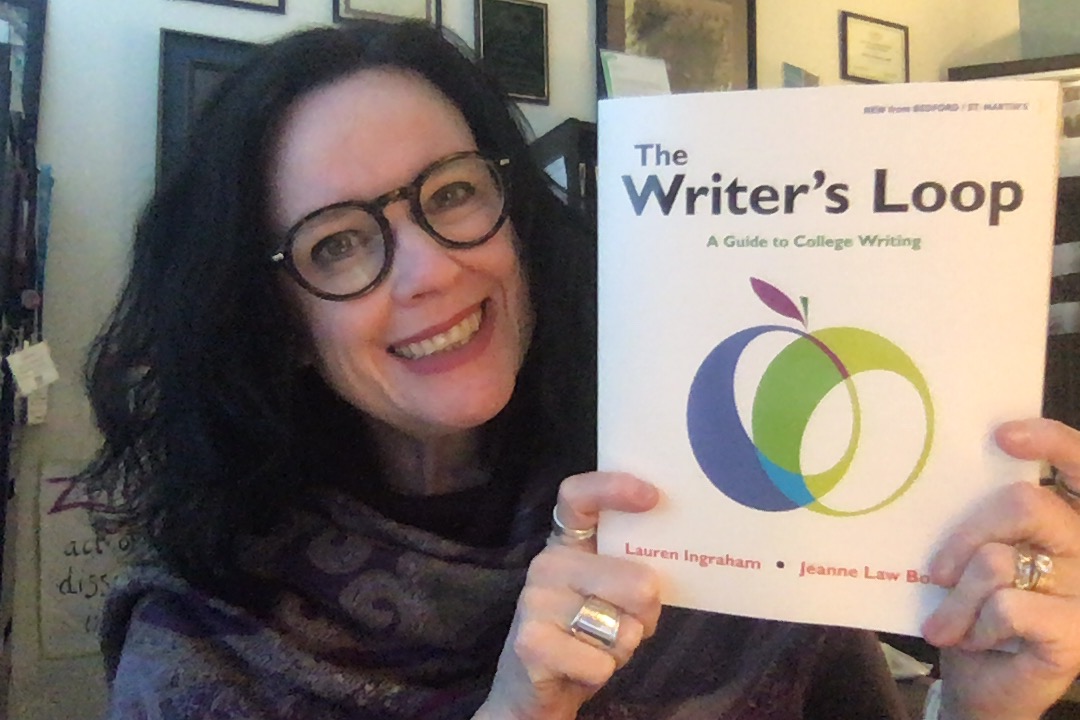
My Rhetorical "Rhet Shot" Meta-Prompt Process
Jeanne Beatrix Law, Ph.D, Professor of English; Coordinator of the MAPW Certificate in AI and Writing Technologies; Faculty Research Lead for Ethical AI, CYPHR; former Director of Composition; Faculty Mentor, AAC&U AI Pedagogy Institute, and LinkedIn Top Digital Learning Voice

My goal is to make AI useful for all of us.
Open Educational Resources to Share:
Custom GPT Instructions (general)
Custom GPT Instructions with Examples
Custom GPT Guidelines Using Rhetorical Prompting
Appeal for Human Rights GPT Assignment
Recent Work:
I am working on several academic and public research projects that connect ethical generative AI use cases with AI literacies. James Madison University added my digital oral history project on the Atlanta Student Movement of 1960 to its map of Black and Digital Public Humanities. My latest peer-reviewed article in the WAC Clearinghouse TextGenEd repository provides step-by-step instructional support for integrating a human-driven AI assignment into your writing course. My latest public piece in The Conversation has generated robust discussions in U.S. and international publications. I have given an invited talk at Georgia Tech about a Prompt-first custom GPT as an open educational resource. I presented a webinar for the AAC&U on custom GPTs as OERs. My rhetorical prompting approach was featured in The Chronicle and by the Chinese Academy for Social Sciences. I share my personal thoughts on SubStack to discuss shifting frontiers in generative AI. I co-authored an article for the OpenAI Educators Community detailing my work with custom GPTs and open educational resources. I delivered a two-part interactive lecture for Savannah State University, featuring my Rhetorical Prompting Method. I have delivered similar interactive lectures for Clayton State University, Valdosta State University, and several community and industry audiences. In November 2024, I also led a half-day workshop on ethical prompting and AI literacy at Open Educa Berlin (OEB).
In September 2024, I served on a plenary, delivered several prompt engineering workshops, and gave an academic integrity presentation at the USG AI Summit.
With three of my student scholars, I have two book chapters accepted for publication. In both chapters, we create and explore custom GPTs as collaborative assignment creators and as a digital archive using the Rhetorical Prompt Engineering Framework and my Four Qualifiers for Ethical Output. I lead a multi-disciplinary research team on a project analyzing students' attitudes towards generative AI use. We have published our preliminary findings in the Sweetland Digital Rhetoric Collective, a digital imprint of the University of Michigan Press. I have also published research, findings, and use cases in an invited blog series hosted by MacMillan Educational Publishing. My recent posts: Post 1; Post 2; Post 3.
Along with co-authors, I have an article in-press with Computers & Writing as well as chapters on AI use cases in an edited collection with the University of Illinois Press. With Dr, Tammy Powell, I co-authored a chapter in Pedagogy Opened: Innovative Theory and Practice (UNG Press). I have delivered numerous workshops on ethical generative AI and specific use cases, including: the Psi Upsilon FishFund Venture Summit; the University of the District of Columbia; CUNY's AI in ED subgroup; OEB 2022, 2023 and 2024; Eastern Michigan University; Southern Polytechnic College of Engineering and Engineering Technology; the KSU Coles College of Business' 2024 AI in Higher Education Symposium; and other statewide summits. I have been appointed to serve as a faculty mentor for the 2024 AAC&U Institute on AI, Pedagogy, and the Curriculum. Upcoming workshops include Online Educa-Berlin (OEB). I also designed and taught a graduate-level prompt engineering course for KSU Master's in Professional Writing Program and am coordinating a proposed graduate certificate in AI and Writing. My work has been featured in KSU's Summit Magazine as well.
I have authored several Coursera courses to help community stakeholders, students, and colleagues engage ethically with generative AI for many diverse use cases. If you are Kennesaw State student, faculty, or staff, you may take these certificate courses for free by following these directions: KSU Free Coursera Instructions
AI for Professional Communication
AI For Marketing: SWOT Analysis, co-authored with Dr. Prachi Gala
AI for Education (Basic) Here's the Intro Video
AI for Education (Intermediate), co-authored with Dr. Tammy Powell and Brayden Milam
AI for Education (Advanced), co-authored with Dr. Tammy Powell. Here's the Intro Video
Atlanta Student Movement Updates - A Custom GPT
Check out the Atlanta Student Movement Oral History Project and the Atlanta Student Movement GPT Archive, a searchable archive I built in Chat/GPT that uses transcripts from oral histories and copyright-free documents about the Movement. The oral history project is funded by a $100,000 grant from the Rich Foundation.
OpenStax Writing Guide Custom GPT
To support students in first-year writing with an open educational resource (OER) that can also be scaled for upper-division and graduate students across disciplines, I developed and am testing a custom GPT that has as its knowledge base the OpenStax Writing Guide. I work with another rockstar graduate student on this project.
First-Year Writing Custom GPT
To support and mentor colleagues aligning their work in our first-year writing program, I have created and trained a custom GPT. I included specific parameters, including: 1. The GPT is closed; only image generation connects to OpenAI's Internet data set. 2. I included TILT data with attributions to Dr. MaryAnn Winkelms. 3. I trained the GPT to align outputs to national and state standards (including the new core IMPACTS) for writing instruction. 4. I trained it also for popular genres of writing: narrative, analysis, argument, annotated bibliography, research outline, and various resesearch projects. 5. I trained the GPT on multimodal writing, including podcasts, video essays, and social media writing. Funding for curricular work developing this resource and several other open educational iniatitives for first-year writing was provided by grants from Affordable Learning Georgia. Check it out: First-Year Comp GPT
Check out my recent media appearances:
Teaching with AI: Chronicle of HIgher Education
STEM Disciplines Need Humanities Majors
Check out my blog on AI
Hit me up on LinkedIn
My Rhetorical "Rhet Shot" Meta-Prompt Process
About Me:

I am Professor of English and the Director of First-year Writing at Kennesaw State. I earned my Ph.D in rhetoric and composition from Georgia State University, specializing in digital humanities and histiographic studies. My research finds further loci in diverse sub-fields of language study, including digital literacies and civil rights oral histories. In the past year, I have also presented and published extensively on generative AI assistants, developing a rhetorical Methods of prompt engineering and advocating for collaborative, ethical human-machine writing outputs. I serve as a faculty mentor for the 2024 AAC&U's Institute on AI, Pedagogy, and the Curriculum. I also teach prompt engineering in KSU Master's in Professional Writing Program.
My public scholarship includes collaborative work with veterans of the Atlanta Student Movement as well as collaborations that will help bring useful and ethical generative AI to personal and professional writing spaces through Rhetorical Prompt Engineering methods.
Read a recent article about my AI research. Watch a recent workshop I delivered on teaching with generative AI.
Check out my co-authored text for first-year writing, The Writer's Loop
My foundational pedagogical philosophy revolves around a key question that I reflect upon throughout each semester and course I teach:
“How can I foster student-scholars’ rhetorical and digital literacy growth in a democratized, community-centered environment, using new media tools, AI technologies, prompt engineering, and dialogic methods to inspire students to advance their writing skills around themes that are meaningful and relevant to their everyday lives?”
I believe in the importance of compassionate and empathetic pedagogy, which frames the classroom as a collaborative space where both teachers and students jointly explore and challenge traditional knowledge. This pedagogical approach emphasizes understanding different perspectives and fostering mutual respect, empowering students to find their voices while valuing those of others. This collaborative teaching style promotes flexibility in course design, from setting adaptable deadlines to selecting project topics and offering a range of writing opportunities, from low-stakes to high-stakes.
To prepare students for the AI-infused workplaces of today, I integrate generative AI tools into my teaching practices. By leveraging these technologies, I provide students with hands-on experience in using AI to enhance their writing, research, and critical thinking skills. This exposure equips them with the digital and AI literacies necessary to lead and succeed in environments where AI plays a pivotal role. Through assignments that utilize generative AI for brainstorming, drafting, and revising, students learn how to use these tools effectively, gaining a deeper understanding of their potential and limitations in professional contexts.
In fostering student success and engagement, especially in digital and AI literacies, I design opportunities for first-year writers to narrate their life experiences across diverse discourse communities and digital platforms. These assignments are not only about making their voices heard in academic conversations but also about preparing them to communicate effectively in AI-driven environments. By incorporating AI-driven writing tools and prompt engineering, I create a collaborative learning atmosphere where students can refine their ideas through iterative processes and peer feedback. This practice aligns with compassionate pedagogy principles, encouraging students to support each other's learning and growth.
Moreover, I use AI-powered platforms to facilitate collaborative writing and measure student progress in real-time. These tools provide immediate feedback, helping students identify strengths and areas for improvement while also highlighting the impact of their contributions within a collaborative setting. This reflective practice helps students develop a sense of ownership over their rhetorical growth and prepares them to think critically and communicate effectively across multiple discourse communities, both within and beyond academia.
Ultimately, I aim for my students to understand from the outset that they are already writers, scholars, and key stakeholders in their educational journeys. They are essential members of a learning community shaped by their needs and aspirations, whether they are digital natives or digital immigrants. By emphasizing compassionate and empathetic pedagogy, along with generative AI and digital literacies, I strive to create an inclusive, reflective, and forward-looking classroom environment where every student is equipped to lead and succeed in the AI-infused workplaces of the present and future.